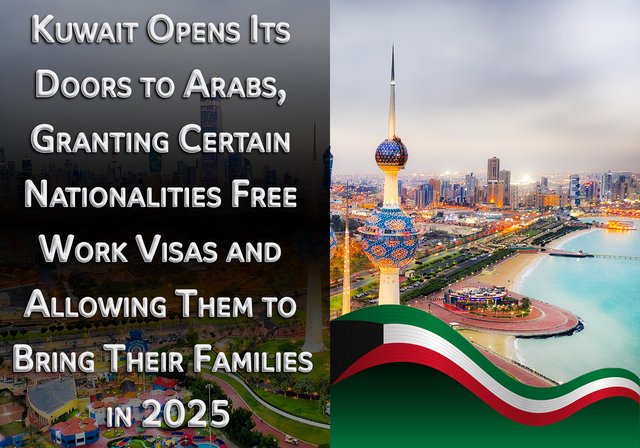The State of Kuwait has announced that it is opening its doors to Yemeni nationals, offering them free work visas and family visit visas allowing them to bring their family members. This comes in response to their special circumstances and under simple conditions. This reflects the Kuwaiti government's commitment to supporting the Yemeni people and assisting them during the crisis their country has been facing for nearly ten years.
Kuwait provides job opportunities for Yemeni nationals and allows them to bring their families.
The Yemeni Embassy in Kuwait confirmed that the Kuwaiti government has approved unprecedented facilitation measures for Yemeni citizens wishing to work in the country.
In a statement, the Yemeni Consul in Kuwait, Ammar Al-Mikhlafi, explained that Kuwaiti authorities have officially granted permission to companies and institutions to recruit Yemeni workers. They have also allowed Yemeni residents in Kuwait to sponsor their families, provided that the resident's monthly income exceeds 800 Kuwaiti dinars.
Great facilities after years of complicated procedures
Consul Al-Mikhlafi pointed out that these facilitations come after years of complicated procedures that previously included direct approvals from the Ministry of Interior for the ambassador's procedures or the issuance of special permits.
He added that these facilities came as a result of a meeting between the Kuwaiti Minister of Interior and the Yemeni Ambassador to Kuwait, Ali Mansour bin Safaa, which reached an agreement to strengthen a number of procedures regulating the entry of Yemenis into Kuwait.
The Yemeni Consul stresses adherence to the law and warns against unreliable travel agencies.
Consul Al-Mikhlafi urged Yemenis wishing to travel to Kuwait to fully adhere to Kuwaiti laws.
He also warned against dealing with unauthorized travel agencies, which he described as a major source of fraud and exploitation. He explained that it is important not to pay any sums before the visa is issued and verified, and to deal exclusively with official sources within Kuwait.
Humanitarian conditions for residence in Kuwait
Although the laws regulating residency are clear, they require precision and compliance. Residency requirements vary depending on the type and purpose of residency, and generally include:
- The presence of a Kuwaiti sponsor or an approved employer (for commercial or job residencies).
- Passport valid for at least 6 months.
- Conducting medical examinations and proving health status.
- Obtain security approval from the Ministry of Interior.
- Proof of employment contract or kinship (for family residencies).
- Renew your residency regularly before it expires, as the residency is considered illegal if the specified period is exceeded without renewal.
Types of residence in Kuwait
Residence cards in Kuwait are divided into several types, each with its own terms and requirements, the most prominent of which are:
- Work permit (Article 18): The most common, granted to employees in both the public and private sectors.
- Family residence (Article 22): Issued to spouses and children, subject to conditions related to income and place of residence.
- Student residence: Granted to students enrolled in recognized educational institutions.
- Residency for government contract holders: granted based on government project contracts.
- Residence of investors and entrepreneurs.
- Each type requires the submission of specific documents and is subject to periodic security reviews.
Why is living in Kuwait the best option in the Gulf?
Kuwait is a leading destination that attracts expatriates of various nationalities, thanks to its economic stability and diverse opportunities. Some of the most important advantages of residing there include:
- Access to a broad and secure labor market.
- The possibility of bringing the family easily, according to clear conditions.
- Advanced health and education services for expatriates.
- Ability to easily modify or transfer residence status.
- Profitable real estate and commercial investment opportunities.
- Residency also provides a sense of legal and psychological stability, especially with the commitment to renewal and fulfillment of conditions.
